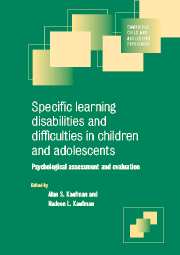 Specific Learning Disabilities and Difficulties in Children and Adolescents
Specific Learning Disabilities and Difficulties in Children and Adolescents Published online by Cambridge University Press: 06 January 2010
This book, Specific learning disabilities and difficulties in children and adolescents: Psychological assessment and evaluation, is devoted to the topic of specific learning disabilities, with a focus on their assessment. The terms ‘learning disabilities’ (LD) and ‘specific learning disabilities’ (SLD) are used interchangeably throughout the book. When a chapter author uses the term learning disabilities, it should always be interpreted as specific learning disabilities.
The field of learning disabilities assessment has long been controversial, and remains so as the twenty-first century begins. Controversies have raged over definitions, interventions, and instruments. Recent articles in the Journal of Learning Disabilities (by leaders in the field such as Linda Siegel, Keith Stanovich, and Frank Vellutino) have called for the elimination of the IQ—achievement discrepancy from the definition of specific learning disabilities, and some leaders are demanding the elimination of IQ tests from the psychoeducational assessment process. To some extent, these arguments are based on the continued use of Wechsler's scales for the diagnosis of specific learning disabilities. We deal with these controversies in the concluding chapter of this book. However, one of the reasons that we wanted to write this book in the first place was because of the many alternatives to the Wechsler scales that became available during the last two decades of the previous millennium.
To save this book to your Kindle, first ensure [email protected] is added to your Approved Personal Document E-mail List under your Personal Document Settings on the Manage Your Content and Devices page of your Amazon account. Then enter the ‘name’ part of your Kindle email address below. Find out more about saving to your Kindle.
Note you can select to save to either the @free.kindle.com or @kindle.com variations. ‘@free.kindle.com’ emails are free but can only be saved to your device when it is connected to wi-fi. ‘@kindle.com’ emails can be delivered even when you are not connected to wi-fi, but note that service fees apply.
Find out more about the Kindle Personal Document Service.
To save content items to your account, please confirm that you agree to abide by our usage policies. If this is the first time you use this feature, you will be asked to authorise Cambridge Core to connect with your account. Find out more about saving content to Dropbox.
To save content items to your account, please confirm that you agree to abide by our usage policies. If this is the first time you use this feature, you will be asked to authorise Cambridge Core to connect with your account. Find out more about saving content to Google Drive.